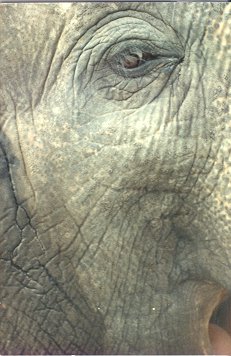Dissonance
Today, dissonance, elephants, and the holiday season. The University of Houston's College of Engineering presents this series about the machines that make our civilization run, and the people whose ingenuity created them.
My wife I and were playing a CD of medieval, Renaissance, and Appalachian Christmas music in the car when we heard a completely unexpected dissonance in the Coventry Carol arrangement. Two voices clashed in a minor second, in the "by by lully" line. It was a delicious sound amid all the lovely consonance of the piece.
We both reached for the rewind button. We wanted to hear it again. And, even as my finger moved, I remembered an article from that morning's New York Times. It was about an Asian elephant who did exactly the same thing we were doing. It told about Richard Lair, who works with elephants in Thailand. Lair realized that elephants have extraordinarily good hearing and that they use a much larger range of vocalizations than other animals. He also knew that elephants have been reported to respond to musical cues.
So Lair joined forces with David Sulzer, who heads a neurology lab at Columbia University and composes music on the side. They've just made a CD of elephant music. Unlike the songs of the humpback whale, this is largely instrumental music. Lair and Sulzer created scaled-up versions of several Thai instruments -- some percussion, and the Thai version of the xylophone. Then they showed each elephant how to create sounds with a mallet held in its trunk.
Right from the start, the elephants began improvising rhythms and melodies. The results, says the article, were "meditative and deliberate, delicate and insistently thrumming." They "strike some Western listeners as haunting, others as monotonous."
Then Sulzer made an experiment. He inserted a wrong note in one elephant's xylophone. She was Prathida, the best of the elephant musicians. At first, she avoided the note -- simply played around it. Then she started going back to it, over and over. Prathida had, it seems, discovered dissonance. She was doing just what my wife and I had done in the car.
The fact that elephants will make music can't be entirely surprising. They're wonderfully intelligent and expressive creatures. But, as I reached for that replay button, a much different dimension of my kinship with Prathida struck me.
It doesn't take a rocket scientist to see that all our seasonal talk about the consonance of peace and good will has to play against a backdrop of clashing notes. What I crave is not peace in its own right, but to see strife resolved. I want to hit the replay button and be rescued from that glaring combination of notes, too close to harmonize and too far apart to be at unity.
In this dark Christmas season, Prathida the elephant reminds us that harmony has to emerge out of dissonance. Any good designer knows that. A harmonious machine is a problem solved, but it exists only because the problem gave birth to it; cacophony is always there. So my hope for this New Year is that you and I, like Prathida, might find the same sudden joy of dissonance resolved.
I'm John Lienhard, at the University of Houston, where we're interested in the way inventive minds work.
(Theme music)
Scigliano, E., A Band With a Lot More to Offer Than Talented Trumpeters. The New York Times, Arts & Ideas, Saturday, Dec. 16, 2000, p. A19.
The recording with the dissonance was: The Pro Arte Singers and the Indiana University Children's Chamber Choir, Paul Hillier, Director. Carols from the Old & New Worlds, Vol. II. Harmonia Mundi, USA, HMU 907233. Band 7.
Versions that use the dissonance are rare. But here is another version of the where you can where you can both hear and see it dissonance very clearly.
https://www.youtube.com/watch?v=_jIYyPOoEc8

The Coventry Carol with the dissonance word underlined in each verse:
Lullay, Thou little tiny Child,
By, by, lully, lullay.
Lullay, Thou little tiny Child,
By, by, lully, lullay.
O sisters too, how may we do,
For to preserve this day.
This poor youngling for whom we sing
By, by, lully, lullay.Herod the king, in his raging,
Charged he hath this day.
His men of might, in his own sight,
All young children to slay.That woe is me, poor Child for Thee!
And ever morn and day,
For thy parting neither say nor sing,
By, by, lully, lullay.